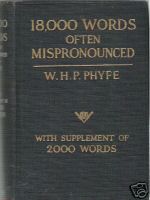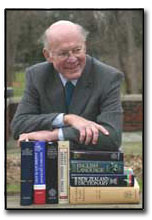
This web page is part of the Michigan Today Archive. To see this story in its original context, click here.
Talking about words: Break-teeth wordsWith Richard W. Bailey
A titled English lady objected to the inclusion of hard-to-pronounce words in Samuel Johnson's Dictionary of 1755. (She had in mind words like turbinated and perflation.) She thought she ought to be able to say words with far less trouble. "Sword," my father used to say with the same pronunciation he used at the beginning of swarthy. "It's sord," my mother would counter. The two pronunciations were a well-rehearsed piece of verbal combat, my father playing his role of the rube and my mother hers of the sophisticate. He defied conventions; she enacted them and passed them on to her children. My father was of the party of Humpty Dumpty when it came to words. "The question is," said Humpty Dumpty, "which is to be master—that's all." My father was inclined to think that he was the master of his words, and if he wanted to say sword or lee-ver (for lever), he would, whatever my mother might think. Not many people are willing to brave out a pronunciation that rouses laughter. Ask anybody and you'll hear stories of the words they've said in the "wrong" way—say, the pronunciation of gaffe with two syllables. Segue pronounced as "see-goo" or victuals as "vick-you-uhlz." When pronunciations like these burst out of the closet, the persons who've used them feel memorably humiliated. They've broken their teeth on a word. In a more orderly universe, spelling could be our friend. In the world of English, it isn't. Social anxiety breeds self-help, and there are plenty of books to consult about the trouble with English spelling. One of the most ambitious was compiled by William Henry Pinkney Phyfe (1855-1915). Phyfe's great work appeared from a New York publisher just the year before his death: Eighteen-thousand Words often Mispronounced: A Carefully Revised, Greatly Enlarged, and Entirely Rewritten edition of "12,000 Words Often Mispronounced." You can get a copy easily for under $10 from online used-book sites; for just a little more, you can get one with the dust jacket. Phyfe started out in 1894 with a collection of 5,000 words often misspelled, but he sussed out where the market was heading and switched to mispronounced words in the same year—selecting 7,000 for special treatment. Phyfe's death did not mark the end of improving books on pronunciation. Two successors published 20,000 Words Often Mispronounced in 1937 with the subtitle a "handbook of difficulties." Of course lots of so-called mispronounced words are in widespread use among educated (and powerful) people: coronet (for the horn), duck tape, expresso, foilage, larnyx, nucular, sherbert. Somebody may say for-tay, thinking that forte has two syllables instead of one. Words like these might arouse a snicker in the punctilious, but the real thigh-slappers are words like "guh-new" or "skizzers" or" puh-salm" or "rondez-voo" or "yachat" (for gnu, psalm, scissors, rendezvous or yacht). People get hot about this sort of thing. Here's "Laura" from a chat-room on English: The pronunciation of February with only one r is more common than the one with two, according to the latest Merriam-Webster dictionary. And being a "pedantic" can't be any fun when the alternative is to be a pedant. It doesn't matter that Laura is wrong. It's the intensity of her anger that should alert us to the power of words. Writing in 1848, the great British philologist A. J. Ellis composed a plea for rational English spelling, and he pointed out that every letter of the alphabet was somewhere silent. He founded societies, printed books and journals, urged his view for a "rational spelling" on the nation. On this side of the Atlantic, the movement developed when Andrew Carnegie put money into it and hired advocates. Even Teddy Roosevelt got excited about the idea and by executive order mandated some 300 reformed spellings to be used by the Government Printing Office. A firestorm of controversy erupted. Congress passed a resolution against it. The Supreme Court claimed that the separation of powers meant that the Executive could not tell the Court how to spell. Newspapers made fun of the idea. Roosevelt withdrew the order. Ellis's idea was that the spelling might tell people how to pronounce words. But nobody wants that! We want to tell the rubes from the sophisticates. We are in love with our ridiculous language.
|
|
Michigan Today News-e is a monthly electronic publication for alumni and friends. |
| MToday NewsE | |
|
|
Michigan Today
online alumni magazine
University Record
faculty & staff newspaper
MGoBlue
athletics
News Service
U-M news
Photo Services
U-M photography
University of Michigan
gateway

 Richard W. Bailey is the Fred Newton Scott Collegiate Professor of English. His most recent book is Rogue Scholar: The Sinister Life and Celebrated Death of Edward H. Rulloff, University of Michigan Press, 2003--a biography of an American thief, impostor, murderer and would-be philologist who lived from 1821 to 1871. It was published by the
Richard W. Bailey is the Fred Newton Scott Collegiate Professor of English. His most recent book is Rogue Scholar: The Sinister Life and Celebrated Death of Edward H. Rulloff, University of Michigan Press, 2003--a biography of an American thief, impostor, murderer and would-be philologist who lived from 1821 to 1871. It was published by the 